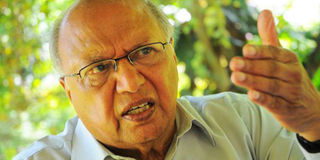Judiciary still reeks of corruption, admits Rao team

Kenya Judges and Magistrates Vetting Board chairman Sharad Rao during an interview at his Muthaiga home in Nairobi on January 30, 2016. The vetting board has said the Judiciary is as corrupt as ever. PHOTO | JAMES EKWAM | NATION MEDIA GROUP
What you need to know:
A full report of the board’s work is being prepared and will be released later.
Chief Justice Willy Mutunga has recommended lifestyle audits for all Judiciary officers to ensure they are living within their means.
The board has handed over the files of 14 magistrates viewed as corrupt for disciplinary action by the Judicial Service Commission.
The Judiciary is as corrupt as ever, a team mandated to clean up the courts has admitted.
After four years of choosing who among the judges and magistrates to retain, the Judges and Magistrates Vetting Board has now made a damning admission that some judges believed to be corrupt are still on the Bench.
“Some judges and magistrates, though widely accepted as being ‘on the take’ ended up being declared suitable because the board based its determinations on evidence and not general perceptions of bribe taking,” said the chairman, Mr Sharad Rao.
Mr Rao was making a presentation during a stakeholders’ conference in Naivasha at the weekend. A full report of the board’s work is being prepared and will be released later.
The admission will deal another blow to the Judiciary, which is already reeling from a string of corruption controversies, culminating in three Supreme Court judges being placed under investigation.
Chief Justice Willy Mutunga has recommended lifestyle audits for all Judiciary officers to ensure they are living within their means.
The board has handed over files of 14 magistrates viewed as corrupt for disciplining by the Judicial Service Commission (JSC).
There was fear that the JSC, made up of judges, magistrates and lawyers elected by their various constituencies, might not discipline errant members.
Board members said lawyers and the public did not want to give the board evidence of corruption.
Only one young lawyer faced a judge accused of corruption and agreed to be cross-examined by the judge’s lawyers.
As the board serves its last month before dissolving, Mr Rao said a Supreme Court ruling, which limited their investigations to cover only the time served by a judge or magistrate until the adoption of the new Constitution, hampered their work.
Before then the board was looking into the conduct of judges and magistrates from before their appointment to 10 days before they were served with the complaints and asked to provide a response, Mr Rao said.
He added: “Although there were strong reasons for believing that corruption had penetrated deeply into the Judiciary and recent events and the Chief Justice’s publicly expressed concerns about corruption confirms this; complaints that reached the board of corruption represented only the tip of the iceberg.”
SH200M BRIBERY ALLEGATION
The board’s admission comes only weeks after a tribunal was established to investigate Supreme Court Judge Philip Tunoi over an allegation that he received a Sh200 million bribe from Nairobi Governor Evans Kidero.
Both Justice Tunoi and Dr Kidero deny the allegation and have welcomed the formation of the tribunal, saying it will give them an opportunity to clear their names.
The Judiciary’s woes were further compounded by reports that a petition had been lodged to investigate three other Supreme Court judges.
Justices Njoki Ndung’u, Mohammed Ibrahim and Jackton Boma Ojwang’ are said to be in trouble with the JSC because of comments they made about the retirement of Deputy Chief Justice Kalpana Rawal and Mr Justice Tunoi.
The three judges are said to have criticised the retirement during a ruling on the Bomet senatorial case though the matter was not before their court.
Both Justice Rawal and Justice Tunoi have attained the retirement age of 70 for judges but are challenging this because they were appointed under the old Constitution, which set their retirement at 74.
Mr Rao said even the most justified assumption of widespread corruption in the courts would not permit the board to jump to negative conclusions about a judge or magistrate without evidence. The board could also not act on generalisations alone.
Mr Rao said though vetting was considered a necessary precondition for changes, it would not single-handedly transform the Judiciary.
He said they considered that sacking a judge or magistrate would impact their professional career and reputation and, therefore, had to be fair.
Most of the complaints were on allegations of incompetence, not of bribery, frequently associated with claims that judges and magistrates were biased, he said.
The board also examined delays in hearing and concluding cases and said these had been drastically reduced.





